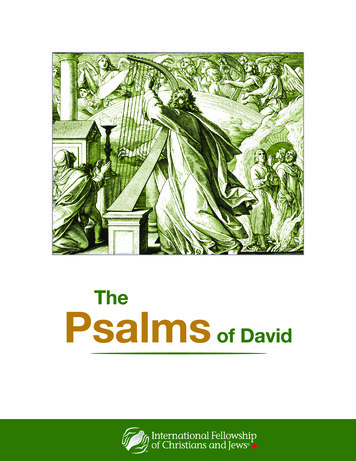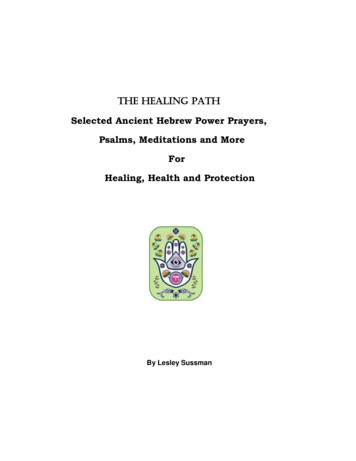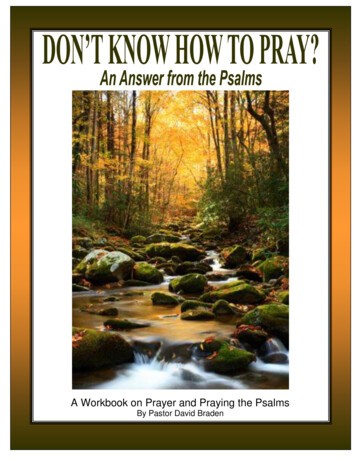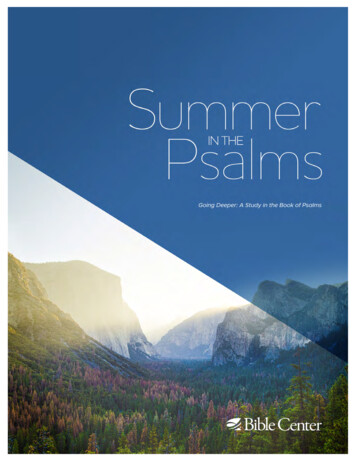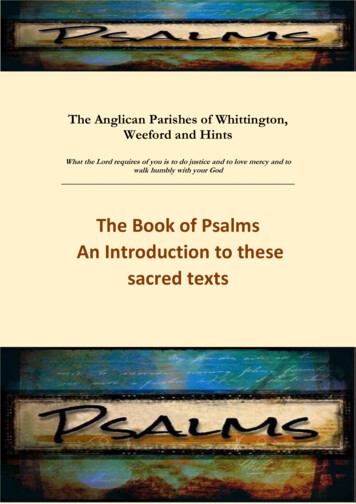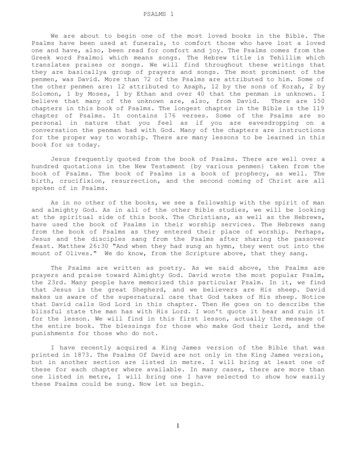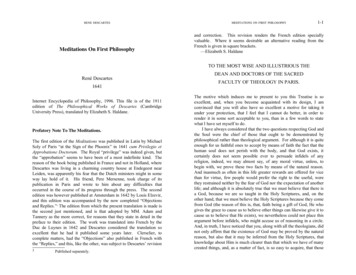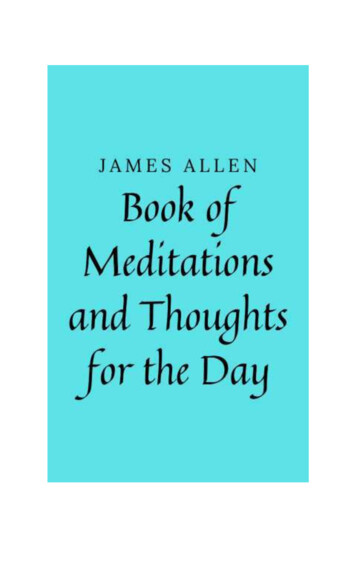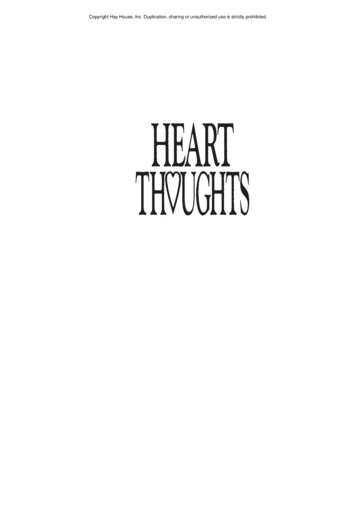
Transcription
Meditations from Psalmswith53 Psalms set to MusicbyTimothy TowPrincipal, Far Eastern Bible CollegeFar Eastern Bible College PressSingapore
Meditations from Psalmswith 53 Psalms set to Music 2006 by Timothy TowCopies obtainable from:FEBC Bookroom(A ministry of Far Eastern Bible College)9A Gilstead Road, Singapore 309063Tel: (65) 62549188Fax: (65) 62513891E-mail: febcbkrm@febc.edu.sgCover design by Melissa NeoLayout by Bible Witness Media MinistryISBN: 981-05-5754-X
ToDr. S. H. Towthese Psalmsareaffectionately dedicated
THE BOOK OF PSALMSWhat words can adequately introduce this Book ofPsalms to us? Who shall say how much it has meant togodly hearts down the years? Here is poetry which morethan vies with that of Milton and Shakespeare, yet it isthe poetry of downright reality; and, as “the body is morethan the raiment,” so here, the reality is greater than thepoetry which expresses it. Here, too, is strong theology- not, however, any merely theoretical theology, but thepractical theology of vivid human experience; and, as“the life is more than meat,” so is concrete experiencemore than abstract doctrine. It is this, fundamentally,which has made the Book of Psalms such a treasure tothe godly.“Hymns to the gods of Greece have been preserved,”says C. J. Ellicott, “but how vast is their differencefrom the Psalms! Let the reader compare one of thosetranslated by Shelley, with any song out of the Psalter.Pretty compliments and well-turned flatteries intendedto propitiate he will find, set, indeed, in melodious versethat celebrates the birth of gods and demi-gods; butno wrestling in prayer with tearful eyes and downcasthead, and the full assurance of faith, such as has madethe Psalms for all time the expression of the devotionalfeelings of men.”This Book of Psalms is a limpid lake which reflects everymood of man’s changeful sky. It is a river of consolationwhich, though swollen with many tears, never fails togladden the fainting. It is a garden of flowers whichnever lose their fragrance, though some of the roses havesharp thorns. It is a stringed instrument which registersevery note of praise and prayer, of triumph and trouble,of gladness and sadness, of hope and fear, and unitesthem all in the full multi-chord of human experience.Baxter6
PSALM 1ONLY TWO WAYSIn this jet age, it is possible not only to fly from onecountry to another in a matter of hours, but also bymany alternative routes. To fly from Singapore to NewYork, you can go West or East and have a choice oftwenty airlines. There are so many routes. There are somany ways.In the eyes of God, there are only two ways in man’sgoings. The Psalmist has discovered this. It is suchan important issue in life that he must tell us on theopening page of this Divine poetry book.The two ways are: 1. The way of the godly that leads toheaven. 2. The way of the ungodly that leads to hell (v.6). In the conclusion of the Sermon on the Mount (Matt.5-7) Jesus confirms what the Psalmist has said. He says,“Enter ye in at the strait gate: for wide is the gate, andbroad is the way, that leadeth to destruction, and manythere be which go in thereat: because strait is the gate,and narrow is the way, which leadeth unto life, and fewthere be that find it” (Matt. 7:13, 14). Reader, on whichway are you?At the end of life’s journey, v. 5 tells of a judgment daywhen every soul must appear before God. The ungodlywill be pronounced guilty and sent downwards. Thegodly will be happily acquitted and sent upwards. Whichverdict will you hear for yourself?In this earthly life also there is a great difference betweenthe two. The man who follows God and keeps himselffrom bad company, who reads the Bible and meditateson its teachings, morning and evening, grows sturdylike a tree planted by some waterway. He draws hisstrength daily from God’s Word and leads a prosperouslife, luxuriant in good works that glorify God and benefitmen. Is that not seen in the life of the Psalmist himself,even King David?7
As to the ungodly, the man who plots evil and holds on tohis unrighteous gains, we see how he must come to ruin.He is like the husks of grain, blown away by the windin the winnowing process. The sad ending of David’senemies, for example, Ahithophel and Joab, is like this.There is not only a dead end in the judgment to come,but also a sad end in the way he goes from now.PSALM 2CHRIST THE MESSIAH, THEANOINTED PRINCEThis is a Messianic Psalm, one that foretells the comingMessiah! Messiah is the Hebrew for the Anointed One,translated Christos in Greek from which we derive‘Christ’ (compare v. 2). Who is better qualified to writeabout Christ, the Son of David, than David himself?David is called by the sacred historian “the man who wasraised up on high, the anointed of the God of Jacob, andthe sweet psalmist of Israel” (II Sam. 23:1). Though thisPsalm has no title of authorship, Peter in Acts 4:25 namesDavid the inspired prophet behind these stanzas.This Psalm naturally divides into four parts, not onlyfrom the sense, but also from the stanzas, which consistof three verses each. The fourfold division is: I. TheNations Revolting (1-3); II. The LORD Reigning (4-6);III. The Son Proclaimed (7-9); IV. The Nations Reproved(10-12).As Peter viewed the rebellious events of his day throughthe lenses of this Psalm, he saw how vain were themachinations of Herod, Pontius Pilate, the Gentilesand the Jews gathered together against the Christ ofGod. So must the eruptions of wicked men in our daybe assessed in this light that we may not be dismayedwhen the enemies of God persecute the Church ofJesus Christ. Our hearts will be gravely troubled underpersecution unless we realise that there is One SupremeLord who gives rule even to wicked kings and dictators8
(Dan. 4:17). He who laughs at the vain rebellions ofChrist’s enemies laughs last and laughs best. What aconsolation is this knowledge of God’s sovereignty tothe Christian minority living among a hostile people. Intimes of testing, the faithful will take courage as theyhear Christ speak, “Fear none of those things whichthou shalt suffer: behold, the devil shall cast some ofyou into prison, that ye may be tried; and ye shall havetribulation ten days: be thou faithful unto death, and Iwill give thee a crown of life” (Rev. 2:10).God the Father Almighty will send His Son to sit onthe throne of David in that day to rule over the wholeworld. “God’s anointed is appointed and shall not bedisappointed” (Spurgeon). The Anointed Prince declaresthe decree of God in His own credentials of being theSon of God. He is moreover given rule over His enemiesfor an inheritance. Jehovah has given His Anointed arod of iron by which He will break them in pieces likepotsherd in the Judgment Day.A message is given to the rebellious to pay homage tothe Prince. To “kiss the Son” is to show subjection ininferiors or religious adoration in worshippers. Whenwe see the Pope, who calls himself “Vicar of Christ,”i.e., “representative of Christ on earth and the headof His Church” (Chambers), being kissed by kings andpresidents, we see him usurping this honour that isreserved for Jesus alone.When the Son becomes angry for allegiance not properlypledged to Him, they will “perish from the way.”PSALM 3“MY SON, MY SON!”What greater tragedy could you imagine than a sonshould rebel against his father? And in the course ofrebellion the closest friends of the father should sidewith the son? When such a rebellion involves a king, it9
shakes up a whole nation. It precipitates a civil war ofmore than bloody dimensions.In the struggle between David and Absalom, every shadeof human intrigue is revealed with stark nakedness. Thedarkest of it all is treachery and the scoundrel in David’scase is Ahithophel. As the darkest is treachery, we seealso the brightest in loyalty and the hero is Hushai.This loyal friend of David was God’s instrument againstAhithophel. (Read II Sam. 15:32-17:23).While we can study a great deal about human intriguesfrom this royal drama, from David we must learn thesecret of finding that help that comes only from God.But while we implore the Almighty for help, we mustbe willing to do His bidding. As King George VI ralliedthe British Empire to a Day of Humiliation and Prayerwhen attacked by Hitler’s Germany, he admonished hissubjects, “Let us pray not so much that God be on ourside as we be on God’s side.” David, the man after God’sown heart (I Sam. 13:14), has triumphed over everyenemy because he is on God’s side and God is on his side.Is our heart right with God and man when we pray toHim in time of need?This Psalm is made up of four stanzas inasmuch as thereare four stances of David’s seeking before his God.I. (vv. 1 & 2). David cries out to God for the rising rebellionagainst him. David complains of the doom heaped uponhim that even God seems to be of no avail. How theenemy delights to see God’s children down and out! Dowe exult over our enemy when he falls? Heed Solomon’sadmonition: “Rejoice not when thine enemy falleth, andlet not thine heart be glad when he stumbleth: lest theLORD see it, and it displease him, and he turn away hiswrath from him” (Prov. 24:17, 18).II. (vv. 3 & 4). David’s prayer is answered! David hasconfidence that though he is driven out of his palace, hewill yet return because God is his garrison. So is everyonewho prays earnestly and finds peace in his heart.10
III. (vv. 5 & 6). One extended result of peace fromanswered prayer is sound sleep, even when one ischeckmated on every side. Physical strength is begottenof spiritual strength (Ps. 127).IV. (vv. 7 & 8). Having seen how God has silenced the evilspeaking enemy and the devouring enemy by smashingtheir cheek bone and their teeth, David pleads for furtherdeliverance. David’s declaration of help obtained froma sovereign God is the basis of Calvin’s doctrine thatsalvation is of the Lord, not of man. Amen.PSALM 4“MY STRENGTH IS AS THE STRENGTH OF TEN,BECAUSE MY HEART IS PURE” - TennysonSpurgeon says this Psalm is apparently intended toaccompany the 3rd and make a pair with it. If the lastmay be entitled “The Morning Psalm”, this from itsmatter is equally deserving of the title “The EveningHymn”.What is significant about this Psalm is the title addressedof the Lord that He is “God of my righteousness”. This isthe only occasion when He is so addressed. David is notshowing a “holier than thou” attitude as if he has no sinat all, as the Pharisee thinks of himself in the templeagainst the publican. David is confident rather that ina certain matter he is falsely accused of by his enemy,he can claim innocence without compunction. His heartis at ease as he calls upon God to be his Judge. Hencehe addresses Him, “O God of my righteousness.” He cansay with Sir Galahad in Tennyson, “My strength is as thestrength of ten, because my heart is pure.”Though he stands innocent in the matter concerned,before God he can only beg for mercy and favour. Thoughwe are clean in our individual transactions, we areunworthy and undone at all times before a thrice holyGod!11
David, who has experienced God’s help before this inrelieving him from a tight spot, pleads with assurance inthe present circumstances. Having been fully assured inhis heart that his prayer is heard, he can tell his enemiesthat the appointed of the Lord will not be disappointed.If the Lord has called you, and you serve Him with allyour heart, you need not be afraid either!A word to those who take sin lightly: “Tremble and sinnot!” Let them, instead of plotting mischief while theyare awake upon their bed (Ps. 36:4), rather search theirown hearts if there be any wicked way in themselves.This exercise of examining one’s innermost self isreflected in David’s prayer in Ps. 139:23, 24. “The heart isdeceitful above all things, and desperately wicked: whocan know it?” (Jer. 17:9). If we often deceive ourselves,don’t we need to search our own hearts, our intentionsand motives, if they are for self or for God?When one has the ten-fold strength from a sense ofone’s accepted standing before God, then one can rejoicein the Lord despite tauntings hurled from every quarter.“For the joy of the LORD is your strength” (Neh. 8:10).One result of such strength in the Lord is a peacefulsleep, a security in Him who watches over us, not only indaylight but also through the hours of the night.PSALM 5DAVID’S SELF EXAMINATION INHIS MORNING PRAYERSThe word “Nehiloth” in the title of this Psalm is thoughtby some to mean “heritage.” Others say it refers to“wind instruments,” inasmuch as “Neginoth” in Psalm 4means “stringed instruments.” Calvin says, “I adopt theopinion of those who hold that it was either a musicalinstrument or a tune; but of what particular kind Iconsider it of little importance to ascertain.”12
Of greater importance is the substance of the Psalmproper wherein David set us the example of praying inthe morning. Spurgeon says, “An hour in the morning isworth two in the evening.” Another says, “To seek Godearly is to seek Him earnestly.”When first thy eyes unveil, give thy soul leaveTo do the like; our bodies but forerunThe spirit’s duty; true hearts spread and heaveUnto their God, as flowers do the sun;Give Him thy first thoughts,Then, so shalt thou keepHim company all day and in Him sleep.- Henry Vaughan 1621-95Of even greater importance than praying early in theday is our heart-condition. “If I regard iniquity in myheart, the Lord will not hear me” (Ps. 66:18). ThereforeDavid reminds himself of a God who hates wickedness,especially those who practise lying and deceit and murder.David’s prayers in the morning lead him to worshipwith others in God’s House, and should he be afar off,he would pray towards His holy temple. Do we seek Godearly everyday and do we go to Church every Lord’s Day?When in travel away from Church, do we set aside a timeto worship Him under different circumstances?As David is surrounded by enemies of all kinds, fromthe treacherous to the flattering (Prov. 29:5), he praysfor their destruction inasmuch as these who lay wait forhim are rebels against the Lord. So David prays for God’sleading him in a straight path lest he be sidetracked intotheir net. He encourages all who trust the Lord like himto rejoice in God their Defender. The God who hatesiniquity will conversely bless the upright in heart. Hewill surround them with His favour and shield themfrom all harm.Will God grant us our requests? There are so manyobstacles set up against us by our enemies, but withHis help we will be delivered. He who seeks God every13
morning and every week in His House with godly fearand worship will not be ashamed.PSALM 6SWIMMING IN MY BED OF TEARSThis is one of David’s seven penitential psalms. In vv.3 & 4, he is spiritually downcast. In vv. 2 & 5, he seemsto be struck down by sickness. In vv. 7 & 10, he talksof confrontation with his enemies. “One woe doth treadupon another’s heel, so fast they follow” (Shakespeare).When troubles come, they come not alone.Those who persist to be “masters of their own fate andcaptains of their own souls” (William E. Henley) perishin their own strength. This is sterile stoicism, a fatalismto suffering and pain. O how sad and how lonely, andsadder and lonelier still, as one advances in age, withoutGod!Christians have David for an example. When misfortunescome, David would take them to be chastenings fromthe Lord. He would quickly run to the Heavenly Fatherfor help. He casts himself before One whom he can trustwould do him good. He implores, first of all, His mercies,for there is nothing good in him he could rely upon tooffer before God. He keeps on pleading and in the heatof his emotions he bursts into tears. His weeping frommixed strong emotions sends torrents of tears onto hisbed, so much so that it almost becomes a swimmingpool! This hyperbole vividly describes how strong histearful pleadings with God are. It is good medicine to letgo the pent-up emotions of the heart. To keep them andhem them makes the burden heavier yet heavier. Ourstrained emotions can harm the mind and body, e.g.causing us to stammer. A Christian in communicationwith a loving Heavenly Father is like a child of a mother’slove. He can run to mother’s bosom and sob it out inmother’s embrace. “Let us therefore come boldly unto14
the throne of grace, that we may obtain mercy, and findgrace to help in time of need” (Heb. 4:16).When we empty our miserable selves before Him, thenHe will fill us with gladness. “Weeping may endure for anight, but joy cometh in the morning” (Ps. 30:5). After anight of soaking-wet weeping for Him, David wakes upin the first rays of a new day with a light heart! He feelshis oppression is removed, particularly the “workers ofiniquity,” his personal enemies. His prayers have beenanswered.“Wait on the LORD: be of good courage, and he shallstrengthen thine heart: wait, I say, on the LORD” (Ps.27:14).PSALM 6HOW LONG, LORD?You have been long in coming, love says. So miserlyare we of the minutes, so leaden-paced is the beat ofthe pendulum, when our heart stands on the tiptoeof expectation. Moments lengthen to hours when wesuffer and await deliverance, just as hours contract tomoments when the heart is young and gay.HOW LONG, LORD, ERE THE TRIAL CEASE? When weare entering into the furnace, we like to bargain withGod that it shall not last beyond a certain hour; but Henever tells us, lest patience might miss her perfect work.He says simply, “It is enough to suffer one moment at atime.”HOW LONG, LORD, ERE DELIVERANCE ARRIVE?Long ago, we sent for reinforcements; and since then thebattle has been waxing more fiercely. We have lookedeagerly to the horizon to see the relieving column, clearcut on the skyline; but in vain. We think we can hold outno more. We have strained at the oar to the last degreeof strength, and if some deliverance does not come to us,15
the fourth watch of night will see us drifting helplesslyto destruction. “Where is thy God?” the enemy cries;and we are tempted to think ourselves forsaken andforgotten.HOW LONG, LORD, ERE THE ADVENT BREAK? He saidthat He would come quickly – but the weary centuriespass; and, strain our ears as we may, we cannot detecthis princely footfall along the corridor of time.Cease, fond heart, thy complaining. Delay is not denial.He counts a thousand years as a day. He is coming onthe wings of every wind; already He is nigh, even at thedoors. Never a moment too early – but not a momenttoo late.PSALM 7APPEAL TO GOD AGAINST THEBLACK SLANDERER“Shiggaion,” which occurs also in Habakkuk 3 in the pluralform, has the sense of “wandering.” One interpretationis that this Psalm is to be sung to a “wandering” tune, atune full of variations of tone. Such a tune seems fittingto the words of this Psalm.Who is Cush the Benjamite? Some think Cush is a hiddenname for Saul, for he was from the house of Benjamin.Others consider the name Cush as symbolical of thedark malice of David’s enemy, inasmuch as a Cushite,an Ethiopian, is black. In Calvin’s opinion, David ishere referring simply to a wicked accuser by the nameof Cush. With all these thoughts in mind, we may bejustified to title this Psalm “Appeal to God Against theBlack Slanderer.”To slander is to falsely accuse another before a thirdperson. This is punishable by law. What aggravatesthis slandering of David, whether before the king, hisministers, or the people, is that David was at peace16
with his accuser and had even delivered the same fromtrouble (v. 4). Slander is character assassination so oftenpractised by the ungrateful and jealous. So like maddogs, they bite the hand that feeds them.When we who are confronted by such a situation in ourinnocence (v. 3) and are stuck as it were in a hole, with noone to help us, let us remember with David that there is aGod to appeal to (v. 1), who will deliver judgment for therighteous against all the forces of evil. David’s defenceagainst slander is in God. David believes that the evilperpetrated by his enemy will boomerang against himin the end (v. 15, 16).He digs a ditch and delves it deep,In hope to hurt his brother;But he shall fall into the pitThat he digged up for other.Thus wrong returneth to the hurtOf him in whom it bred;And all the mischief that he wroughtShall fall upon his head.Steinhold and HopkinsDivine retribution comes swift and sure, or long delayed,but it will surely come. Let us refrain from speaking guileagainst our brother. Martin Luther would not listen toanyone who should speak a word against his brother inhis absence.PSALM 8“HOW GREAT THOU ART!”In this jet age when man hops from country to countryin near-sonic travel, and space-shuttling became routinewith the mighty until the “Challenger” disaster, hemakes himself the centre of this whirling world. Thoughhe straddles the skies, he rarely looks out of his cabinwindow to behold the glories of God’s creation. Whathe sees are hordes of his own kind queuing and rushing17
each day in a struggling existence, himself a speck in thesurging human tide. How stifled is his soul!Let him return to his status of an earthworm, let himretreat to some countryside with crawling steps. Let himlook up to the night-blue sky above and sing in adorationwith David, “O LORD our Lord, how excellent is thyname in all the earth! who hast set thy glory above theheavens” (Ps. 8:1). Let him echo to another nature psalmof David, “The heavens declare the glory of God; and thefirmament sheweth his handywork” (Ps. 19:1).Let us with David’s child-simple faith praise the Almightylike little children. Their innocent voices are a delightto both God and men, except those who are hardenedenemies to the Truth. Our Lord quoted v. 2 to silencethe chief priests and Scribes who resented the children’sHosannas to the Son of David, their Lord and Creator.It is when we see the wonders of God’s creation, thegalaxies of stars, and the moon on a clear autumn night,that we sink back into our smallness. Yet, we are the apexof God’s creation, and the apple of His eye (Ps. 17:8).Though we are “a little lower than the angels” by ourmortality, and Jesus who has taken upon Himselfour flesh and blood to die in our stead is also “made alittle lower than the angels” (Heb 2:9-18), yet we areto triumph with Him who is our Head, to be crownedwith glory and honour. In Jesus Christ we have Paradiseregained. We, who are sons by adoption in Him, shallreign together with Him over the whole creation “whenthe times of refreshing shall come from the presence ofthe Lord” (Acts 3:19).In spite of our rebellion in Adam, the mandate to manto “have dominion over the fish of the sea, and over thefowl of the air, and over every living thing that movethupon the earth” remains (Gen. 1:28). Alas, it is whenman tries to invade God’s territory, the spheres aboveour air-region, that such a disaster as the burning up of18
seven American astronauts early 1986 must occur to putman in his proper place.In conclusion, let us echo with David, “like a goodcomposer returning to his keynote, falling back as it wereinto his first state of wondering adoration” (Spurgeon).PSALM 9TRIUMPH OVER THE HEATHENThe Hebrew term “Muth-labben” means “Death of theSon”. Scofield thinks it is possibly connected with IISamuel 12:20. Certain ancient commentators thinkthe Son in this context refers to the Son of Perdition inGoliath. David wrote this Psalm, a Triumphal Hymn overhis enemy, that it might strengthen the church militanton earth till she becomes the church triumphant inheaven. (Remember Christian in Pilgrim’s Progress.)This Psalm may be divided into two unequal partsparalleling each other as follows:I. 1. Jubilant thanksgiving(vv. 1-6)2. Confidence in the future(vv. 7-12)3. Closing prayer(vv. 13, 14)II. 1. Similar thoughts(vv. 15, 16)2. Similar thoughts(vv. 17, 18)3. Similar thoughts(vv. 19, 20)Although David had fought hard to vanquish his enemy,pride did not enter his head to make him top-heavy. Hegave all glory to God to whom he looked always for help.His strength over his enemy is this lowly attitude thatgains God’s favour. For God gives grace to the humble,but resists the proud (I Pet. 5:5). God was so pleased withDavid’s loving obedience that He called him “a man afterhis own heart” (I Sam. 13:14). The opposite number toDavid is king Saul who was rejected for being self-willedand vainglorious. Whereas God readily pardoned Davidin the matter of Bathsheba because he acknowledged hissins in deepest contrition, Saul the stubborn and self-19
exalting found no consolation of forgiveness, whichdrove him to necromancy and death. “Thus saith theLORD, Let not the wise man glory in his wisdom, neitherlet the mighty man glory in his might, let not the richman glory in his riches: but let him that glorieth gloryin this, that he understandeth and knoweth me, that Iam the LORD which exercise lovingkindness, judgment,and righteousness, in the earth: for in these things Idelight, saith the LORD” (Jer. 9:23, 24).Having experienced God’s mercies and judgment in thepast, David can look into the future with confidence.Notice the future tense that prevails in this section,vv. 7-12. The Lord will be judge, refuge and king in thatday when the whole world will come before Him forjudgment. Again, it is the humble who will be heardwhen they cry to Him.This hymn of triumph over the heathen closes withprayer for mercy and a holy determination to praise theLord before the multitudes of his people.This threefold thanksgiving, confidence and prayerrecurs in the latter part of this Psalm from vv. 15-20 asa sort of sweet refrain.PSALM 10PETITION AGAINST OPPRESSORSOF THE POOR AND ORPHANEDAlthough there is no title to this Psalm, a good manycommentators including Calvin consider this to be from“the sweet Psalmist of Israel.” Calvin regards this Psalmas a complaint that “fraud, extortion, cruelty, violenceand all kinds of injustice” prevailed everywhere in theworld. How true this statement is. We say it this waytoday, “Big fish eat small fish.”It is most ironical to see the wicked, mighty andpowerful, the bully, while persecuting and eating up the20
poor and fatherless (vv. 2, 18), crawl and cringe beforethe powerful of his own kind, even the covetous (v. 3). Asto God, he wilfully dismisses Him from his mind (v. 4),or imagines Him to have forgotten or to be blind to hiscrimes (v. 11). He uses all kinds of stratagems to catchhis prey, the poor and helpless, by lurking in the villages,like a lion in his den (vv. 8, 9). He stoops in humility inorder to conquer the unsuspecting.Plumer says, “There is a consanguinity between all sins.”Compare v. 6 with several preceding and succeedingverses. Pride, cruelty, cunning, boasting, lust,covetousness, false peace, want of docility, practicalatheism, spiritual blindness, contempt, cursing, deceit,fraud, mischief and vanity are a frightful sisterhood. TheApostle James told us no new thing when he depicted(James 3:2-13) the dreadful evils of a wicked tongue (v.7). Death and life are in its power. There is no greaterwickedness than that which breaks out in words. Itis amazing what mean artifices are resorted to by thebest of the oppressors of God’s truth and people, evenby people commonly fair in other matters (vv. 7, 8). Thefawning, crouching, sycophantic part often played bythe cruel and wicked can deceive none but the simpleand inexperienced (v. 10).When we are poor and fatherless, isolated and discarded,is it not wonderful to know from the Psalmist that wehave a free recourse to God, the Judge of all the earth(Gen. 18:25)? He is ever ready to hear the cries of theoppressed and have all their grievances redressed.“What a friend we have in Jesus. . . What a privilege tocarry everything to God in prayer.” Amen!PSALM 11FLEE AS A BIRD?“To every thing there is a season, and a time to everypurpose under the heaven” (Eccles. 3:1).21
And so, the Preacher goes on with “a time to be born,and a time to die. . . a time to keep silence, and a time tospeak. . .”There is a time when one needs to flee from one’s enemy,as advised by our Lord, “But when they persecute youin this city, flee ye into another” (Matt. 10:23). WhenDavid’s life was chased by Saul’s javelin the third time,which missed him but got stuck in the wall, the youngcourtier resolved at last to flee, and he escaped that nightthrough a window (I Sam. 19:9-12).However, there is also a time to stay, to stand on one’sground, and this David did through many trials until hefound no other way out but to exit from Saul’s palace.When God’s time for one to leave one’s station hasnot come, come what may, one must hold on to one’sassignment. Hence the advice given to David to flee as abird, perhaps as a partridge, to the mountains, must berejected. The zero hour for our destruction, as plannedby our enemy, may be fast approaching, but unless theLord gives the word to leave, we must stick to the veryend! With God promising us help, it is safer to go througha storm than to keep out of it without His permission.May David’s perseverance in the face of grave dangerstrengthen us in the perilous days ahead.It is true that the very foundations of justice aredestroyed under King Saul, for example, the massacreof the 85 priests of Nob (I Sam. 22:18) so that thosewho stand for righteousness can do little under suchoppression. Nevertheless, David will not lose heart. Heappeals to the Judge of heaven, whose throne is His holytemple. By appealing to his Lord, he knows the wickedwill be brought to book. He is compensated with theknowledge that God will punish the wicked even withfire and brimstone and a holocaust. They will receivetheir portion of punishment in due course. The righteouswill find favour because the Lord loveth righteousness.22
PSALM 12FLATTERING LIPS AND LYING TONGUEIf you read about the life of King David, you will see himsurrounded by more bad people than good. The formerare in the king’s army and in his court for the sake oftheir own belly. They jockeyed for position and powerand used every stratagem to push the
the Psalms for all time the expression of the devotional feelings of men.” This Book of Psalms is a limpid lake which reflects every mood of man’s changeful sky. It is a river of consolation which, though swollen with many tears, never fail

